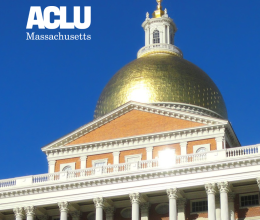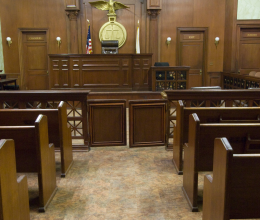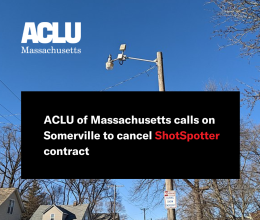
UPDATE: In a major victory, the Massachusetts Supreme Judicial Court ruled in January 2024 that the Hampden County District Attorney’s Office violated its duties to disclose and inquire about exculpatory evidence of widespread misconduct by Springfield police, following a damning report by the U.S. Department of Justice in 2020. The court also ordered the DA to disclose in criminal cases all documents known to have been reviewed by DOJ in the production of that report.
In April 2021, the ACLU of Massachusetts, together with the ACLU, the Committee for Public Counsel Services (CPCS), and law firm Goulston & Storrs, filed a lawsuit asking the Supreme Judicial Court to call for an investigation into Springfield police violence and misconduct, and to ensure that the Hampden County District Attorney’s Office’s (HCDAO) properly discloses that misconduct as exculpatory evidence in criminal cases.
The lawsuit was filed on behalf of people and groups affected by these failures: two individuals who have been prosecuted in Hampden County, two criminal defense lawyers who practice in Hampden County, CPCS itself, and the bar advocate organization Hampden County Lawyers for Justice.
Criminal indictments, community complaints, media reports, and lawsuits revealed widespread misconduct in the Springfield Police Department (SPD). In the Trump administration’s only investigation against a police department, the United States Department of Justice (DOJ) released a July 2020 report detailing six years of egregious, excessive force and false reporting by the SPD. The report shows that no entity—including the HCDAO—fulfilled their obligation to properly investigate officers accused of misconduct, or to inform defendants about misconduct by officers who could testify against them.
In response to the Massachusetts drug lab scandals, courts have made clear that the Commonwealth has a duty to investigate and disclose, on a case-by-case basis, egregious misconduct by government employees who participate as members of prosecution teams. Yet, at the time of filing, no investigation has been conducted to determine the full scope and impact of misconduct by SPD officers who are central figures in prosecution teams. Nor are there regular and thorough disclosures of the SPD’s misconduct in cases where individuals are prosecuted based on the word of SPD officers. Instead, the HCDAO has relied on Springfield police to obtain search warrants, bring charges, and secure convictions while inadequately disclosing evidence of officer misconduct to defense attorneys and defendants.
During the drug lab scandals, thousands of people were wrongfully convicted of drug crimes based on faulty evidence and a government cover-up. In response, after years of ACLU litigation, the Massachusetts Supreme Judicial Court stepped in to correct the Commonwealth’s failure to investigate. At the time of filing, Massachusetts has not implemented the system of investigation, disclosure, and notice developed by the Court in the drug lab context.
The petitioners ask the Massachusetts Supreme Judicial Court to call for an investigation into the SPD and provide interim solutions to mitigate any ongoing due process violations in the lower courts. The petition also asks the Court to make sure that the HCDAO’s practices are adequate to disclose evidence of SPD misconduct to criminal defendants, and thereby to protect the integrity of the criminal legal system in Springfield.







